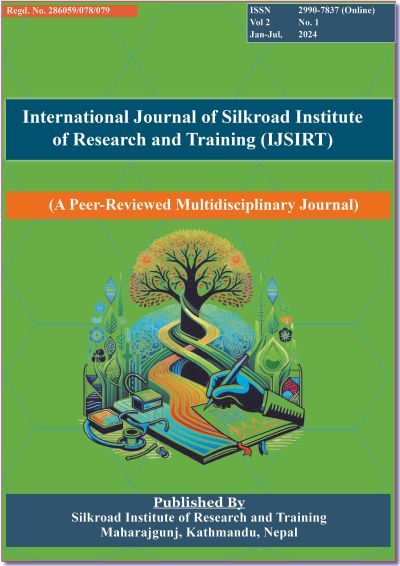Nursing Students’ Experience and Perception towards Online Education during Covid-19 Pandemic in Nepal
DOI:
https://doi.org/10.3126/ijsirt.v1i2.68464Abstract
Background: The COVID-19 pandemic forced educational institutions worldwide to adapt swiftly. This study explored
nursing students’ experiences and perceptions towards online education during the pandemic in Nepal.
Method: Using a cross-sectional descriptive design, data were collected from 416 nursing students across the country using
non probability convenient sampling technique via a google form questionnaire. Ethical approval was obtained from NHRC
and for the data analysis, descriptive analysis was done by using appropriate statistical tools and SPSS version 20.
Result: Key findings on online class experience, 93.5% participated in live online classes, 62.3% preferred a blend of
subjective and objective evaluation methods and 58.9% favored pre- and post-classroom assignments. Similarly, regarding
benefits of online education 25.0% strongly agreed that technical skills (email, internet, apps) improved, 53.1% recognized
teachers’ facilitative role in student learning and 45.2% believed online classes reduced psychological stress. There were
challenges on theory classes and clinical practicum where 38.8% acknowledged skill gaps for effective online teaching and
44.0% strongly agreed on curriculum redesign respectively.
Conclusion: Online learning is crucial for a variety of reasons, including time savings and learning flexibility. Despite these,
constrained technology infrastructures, connectivity issues and clinical practicum continued to be obstacles. Effective online
education requires increased internet access, faculty and student digital training, and the support of regulatory authorities.
Downloads
Downloads
Published
How to Cite
Issue
Section
License
Copyright (c) 2024 Bimala Kumari Sah, Suvekshya Silwal, Bibhav Adhikari, Apsara Pandey, Bipasha Gupta

This work is licensed under a Creative Commons Attribution-ShareAlike 4.0 International License.
CC BY-SA: This license allows reusers to distribute, remix, adapt, and build upon the material in any medium or format, so long as attribution is given to the creator. The license allows for commercial use. If you remix, adapt, or build upon the material, you must license the modified material under identical terms.




